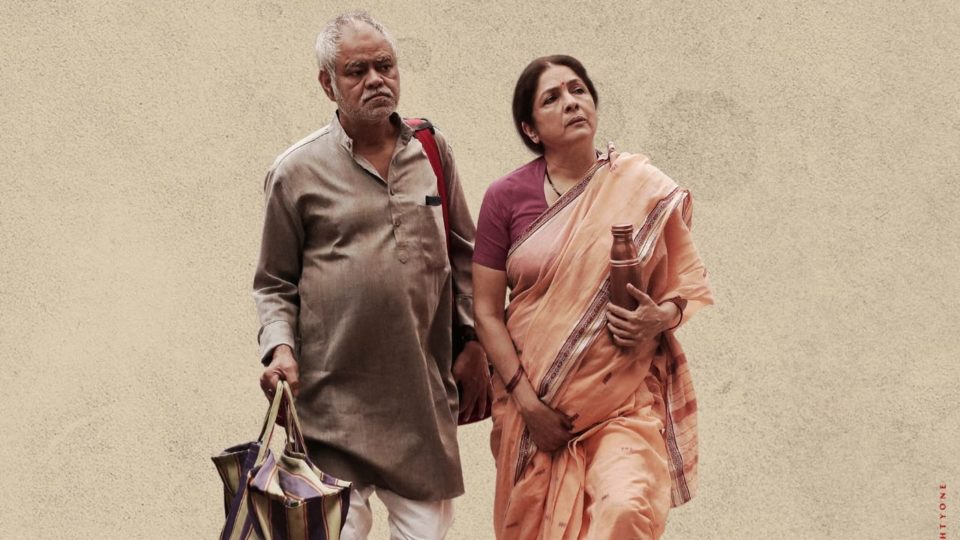‘Vadh,’ a Murderous Tale of Fair Foul Play
The film featuring excellent actors tells a compelling story about a murder pivoted on righteous moral compulsions
Vadh
Cast: Sanjay Mishra, Neena Gupta, Saurabh Sachdeva, Manav Vij
Direction: Jaspal Singh Sandhu & Rajeev Barnwal
Rating: ★★1/2
Showing in cinemas
Strictly speaking, the two Hindi words, vadh and hatya, mean the same thing: murder. But a fine moral line separates them. That distinction comes from motive, making murder for self-gratification a condemnable criminal act, and celebrating murder committed for greater good as a divine act of saving the world from evil.
Based on a story from the Hindi-Urdu crime magazine Manohar Kahaniyan, Vadh tells a compelling story about a murder pivoted on righteous moral compulsions.
Written and directed by Jaspal Singh Sandhu and Rajeev Barnwal, the film has a superb plot, nicely etched characters, excellent actors, gripping twists, and yet Vadh doesn’t achieve the potential it’s brimming with because it suffers from a strange ailment: The writers and directors are able to pull off the film’s main scenes, including dramatic and action sequences, but they seem clueless about how their actors should talk, stand or even look in between these.
So, we get awkward scenes with gratuitous dialogue and gestures after every major plot point, as if the film is trying to bide its time till the next big scene.
Vadh has too many such sinkholes. But it is repeatedly saved from drowning into these by the film’s four main actors – Sanjay Mishra, Neena Gupta, Saurabh Sachdeva and Manav Vij. Despite having nothing to do in many of their scenes, they improvise and manage to keep the story together, not letting it disintegrate.
Vadh is set in Gwalior, MP, where Shambhunath (Sanjay Mishra) and Manju Mishra (Neena Gupta), an aging couple, live. Shambhunath is referred to as “Masterji” because he teaches poor locality kids. He also takes care of his wife, Manju. A strict vegetarian and devout Hindu, Manju’s knees hurt a lot, but she climbs up to the terrace of her house every day to pray.
Their affection for each other is heart-warming, and their joint struggle to pay off the loans they took to send their son abroad is deeply disturbing.
Once a week they take a rickshaw to a cyber cafe from where they Skype-call their son, Guddu. He is mostly irritated and often cuts the call abruptly.
The film spends a considerable amount of time with the Mishras, in their grihasti. We see them argue when Manju says she won’t let even a mouse be killed in her house, and we see them yearn for a daughter when they celebrate the birthday of a girl student. We visit Masterji’s bank, and worry with him when the floating interest on the loan means higher installments.
The peace of their everydayness is broken very rudely by Prajapati Pandey (Saurabh Sachdeva), a local baddie who lent them money and arrives at their doorstep to collect the principal amount with interest.
He always knocks at night, with a girl and a booze bottle in tow. Throwing a packet of tandoori chicken on their small table, he sits sprawled out on their sofa, ordering Masterji and Manju around, as if they were his servants. And sometimes he drags the girl into their bedroom, shutting the door in their face.
Shakti Singh (Manav Vij), the area’s senior cop, seems to be aware of Pandey’s proclivity for harassing those who are below him in the food chain, but they have some shady dealings.
With no means of returning the loans and a capricious son, the Mishras are caught in a frustrating bind. They have to do what Pandey asks them to, even as they simmer with anger and tremble with fear.
Vadh uses the Mishras’ ordinariness and vulnerability to create a tense situation in which we find ourselves emotionally invested and constantly worried for their well-being. Pandey’s presence in their home feels so wrong, so disgusting. And when he arrives one evening and tells Masterji to fetch his young girl student, the distinction between hatya and vadh becomes very clear.
Real crime is always compelling, especially crime committed by good men pushed into a corner.
The second half of Vadh is devoted to a murder cover-up and a murder investigation where the Mishras are pitted against the cops while a dreaded loan shark, Rathore, for whom Pandey works, tries to evict them from their home.
In Vadh‘s simple universe of an ageing couple who are hapless victims, violence makes moral and practical sense and leaves us satisfied. There’s even a little swagger in the end, a bounce of the meek that feels justified.
Neena Gupta has a warmth about her that she imparts to every film she is a part of. She brings that to Vadh while grounding it and giving it a touch of the real.
Sanjay Mishra works here with silences that convey his desperation and vulnerability beautifully.
Saurabh Sachdeva and Manav Vij are very good, but something went wrong when they were recording their dialogue. Their audio often doesn’t match their video.
Despite these glitches, Vadh is worth a watch.








